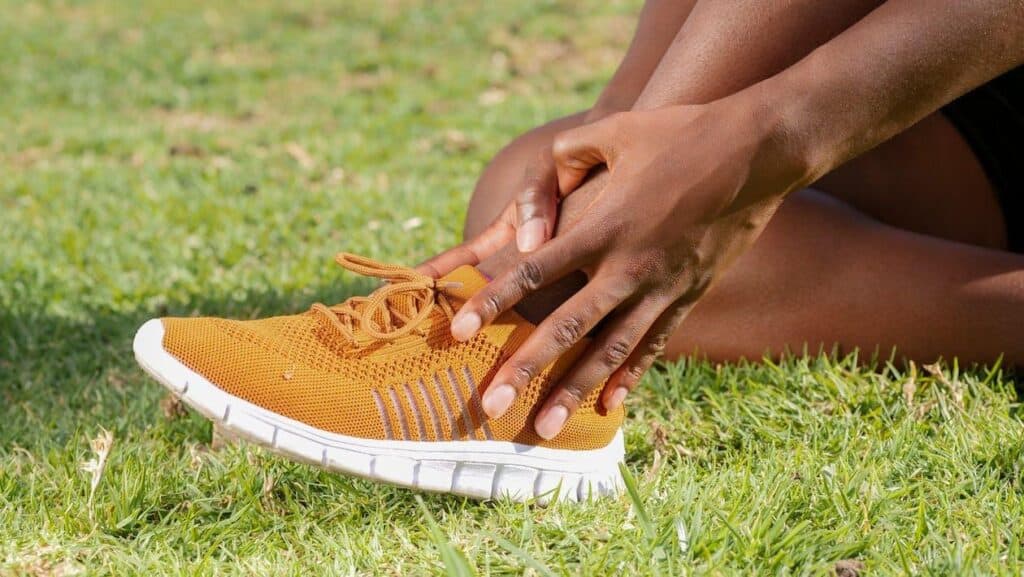We often go through our daily routines without giving much thought to our feet and ankles, yet they are always with us. When pain and discomfort affect our feet and ankles, it can be quite disruptive and unsettling. This guide is designed to give a clearer idea of the causes of this kind of pain, comprehensive foot and ankle pain treatment, and methods for foot and ankle pain relief. We hope that this information will allow you to move freely and comfortably, without the hindrance of pain.

(Source: https://www.pexels.com/photo/a-person-touching-his-ankle-7298678/)
Picture this: you’re strolling through a park, the sun warming your face, when suddenly, a sharp pain shoots through your ankle. Or perhaps you wake up one morning, and your foot aches as if it’s been protesting all night. We’ve all been there – those moments when foot and ankle pain seemingly appear out of nowhere, leaving us bewildered and in discomfort. Let’s look at the very roots of foot and ankle pain. It’s time to demystify the signals your body is sending and embark on a path toward relief and healing.
Strained Muscles and Ligaments – Just like a tired body after a long day’s work, our feet and ankles can get strained from overexertion, whether it’s a long hike or a day of standing on hard surfaces.
Arthritis – Our joints wear down over time, leading to pain and stiffness in the feet and ankles.
Injuries and Sprains – Accidents happen, and sometimes it’s like stumbling on an uneven sidewalk. Ankle sprains, fractures, or twists can leave us in pain.
Improper footwear – Ill-fitting shoes are like a constant annoyance. They can squeeze our toes, offer inadequate support, and lead to discomfort that lingers long after we kick off those shoes.
When it comes to foot and ankle pain, it’s a bit like navigating through life’s uncertainties – sometimes, you’re unsure if you should soldier on or seek help. But here’s the thing: knowing when to reach out to a professional can make all the difference in your journey to relief and recovery.
Consider it like this: your feet and ankles are your trusty companions on life’s path. They carry you through the ups and downs, but when they start sending distress signals, it’s time to listen.
So, when should you pick up the phone or schedule that appointment?
Persistent Pain – Think of it as your body’s way of saying, “Hey, something’s not right.” If the pain lingers, persists, or worsens despite your best efforts, it’s a clear sign to consult a professional.
Inability to Bear Weight – When your feet and ankles stage a protest, making it painful or impossible to put weight on them, it’s time to reach out for guidance.
Swelling and Inflammation – Swelling, like an unwelcome guest, can indicate an underlying issue. If it appears suddenly, stays for an extended visit, or seems disproportionate to the injury, it’s worth investigating.
Bruising or Discoloration – Just as you’d notice a bruise on your arm, bruising or unusual discoloration on your feet and ankles shouldn’t be ignored. It can be a sign of injury or other concerns.
When it comes to finding relief from foot and ankle pain, sometimes it’s the simple, everyday remedies that provide the most comfort. Think of it as tending to your body’s well-being, much like nurturing a cherished plant in your garden. Let’s delve into the world of conservative approaches – home remedies and self-care tips that can help alleviate discomfort in a way that feels truly human.
RICE Method – Picture this: after a long day, you’ve got an ache in your ankle, maybe from a minor sprain or overuse. It’s like a gentle reminder from your body to take it easy. Enter the RICE method – Rest, Ice, Compression, and Elevation. Just like you’d rest when you’re tired, applying ice, gentle compression, and elevating the affected area can soothe inflammation and promote healing.
Proper Footwear – Think of choosing the right shoes as selecting the perfect tools for a task. Your feet and ankles deserve proper support and comfort. Opt for shoes that fit well, provide adequate cushioning, and match the activity you’re engaging in.
Stretching and Exercises – Just as you’d do a few stretches after waking up, your feet and ankles benefit from gentle exercises and stretches. These can help improve flexibility, strengthen muscles, and alleviate pain caused by tightness or strain.
Over-the-Counter Remedies – Over-the-counter pain relievers can be like a friend offering a helping hand during tough times. They can temporarily reduce pain and inflammation. However, it’s essential to use them as directed and consult a healthcare provider if the pain persists.
When it comes to tackling moderate to severe foot and ankle pain, sometimes our bodies need a little extra help, much like seeking the advice of a trusted friend when facing a tough decision. In the world of medical interventions, there are various options that can provide that much-needed assistance in a way that respects our humanity.
Physical Therapy – Think of physical therapy as a guided journey back to strength and mobility. Just like a personal trainer tailors workouts to your needs, a physical therapist creates a custom plan to target the source of your pain. They’re like the compass that guides you toward recovery.
Orthotics and Bracing – Sometimes, our feet and ankles need a little extra support, similar to wearing a cast when a bone is broken. Orthotics and braces provide that additional stability, helping to alleviate pain and promote healing.
Injections – Injections may sound intimidating, but they can be like targeted magic for pain relief. They deliver medication directly to the affected area, providing quick and effective relief from conditions like plantar fasciitis or arthritis.
The road to recovery often leads to a place where rehabilitation and physical therapy become your trusted companions, guiding you back to strength and mobility in a way that deeply resonates with our human experiences.
Personalized Rehabilitation – Think of rehabilitation as a tailor-made path to recovery, like a personal trainer who understands your unique needs. Whether you’re healing from a sprain, fracture, or surgery, rehabilitation specialists create a plan that’s just for you, focusing on your specific challenges and goals.
Targeted Exercises – These exercises are like the building blocks of your recovery, similar to a sculptor shaping a masterpiece. They’re designed to strengthen weakened muscles, improve flexibility, and enhance balance. With each session, you’re one step closer to regaining your full potential.
Hands-On Therapy – Hands-on therapy, performed by skilled physical therapists, can be compared to a skilled masseuse working out the knots in your muscles. It involves manual techniques to alleviate pain, reduce inflammation, and restore joint mobility, providing much-needed relief.
Pain Management – Pain management strategies are like a soothing balm for your discomfort. They may include techniques such as ice or heat therapy, electrical stimulation, or even ultrasound to alleviate pain and promote healing.
Preventing future pain in your feet and ankles is like investing in a secure future. By incorporating these habits into your daily life, you’re ensuring that your trusted companions continue to support you on your life’s journey, pain-free and full of vitality.
Regular Exercise – Exercise is like a daily ritual for your feet and ankles. Incorporate routines that strengthen muscles, improve flexibility, and promote overall foot health. It’s like giving them a daily dose of vitality.
Mind Your Posture – Good posture isn’t just about looking confident; it’s about maintaining the well-being of your entire body, including your feet and ankles. Be mindful of how you stand and walk to prevent undue stress on these vital body parts.
Maintain a Healthy Weight – Much like balancing your budget to secure your financial future, maintaining a healthy weight safeguards your foot and ankle health. Excess weight can strain these areas, leading to pain and discomfort.
Foot Hygiene – Foot hygiene is like nurturing a thriving garden. Keep your feet clean and dry to prevent fungal infections and other foot ailments. Moisturize when needed, and trim your toenails properly.
Armed with knowledge and compassion for our feet and ankles, we stand prepared to stride confidently into the future. We wish that this guide has provided not only helpful insights but also a feeling of understanding, like a comforting pat on the back during difficult moments. As you continue on your path, keep in mind that your steps signify strength, consideration, and a deep link with the amazing voyage known as life.
Foot nerve pain treatment focuses on relieving discomfort caused by nerve damage or irritation in the foot. Options include medication, physiotherapy, injections, or surgery, depending on the underlying cause.
Foot nerve pain can result from conditions like peripheral neuropathy, nerve compression, diabetes, injuries, or autoimmune disorders. Proper diagnosis is essential for effective treatment.
Doctors use physical exams, nerve conduction studies, imaging tests like MRIs, and blood tests to identify the root cause of foot nerve pain.
Yes, medications like anti-inflammatories, nerve stabilizers, or topical creams can help manage foot nerve pain. Always consult a specialist for the best option.
Non-surgical treatments include physical therapy, orthotics, nerve stimulation, pain relief injections, and lifestyle modifications to reduce stress on the feet.
While some cases of foot nerve pain can be cured, others may require long-term management. Early intervention often improves outcomes significantly.
In severe cases, surgery may be recommended to decompress nerves, repair nerve damage, or remove any growths causing pain.
Treatment results vary depending on the cause and method used. Some patients experience relief in weeks, while others may require ongoing therapy.
Seek medical attention if foot nerve pain persists for more than a few days, worsens over time, or is accompanied by numbness or difficulty walking.
Yes, improper footwear can aggravate nerve pain in the feet. Orthopedic shoes or custom insoles can help relieve pressure and improve comfort.

Dr Yong Ren graduated from the National University of Singapore’s Medical faculty and embarked on his orthopaedic career soon after. Upon completion of his training locally, he served briefly as an orthopaedic trauma surgeon in Khoo Teck Puat hospital before embarking on sub-specialty training in Switzerland at the famed Inselspital in Bern.
He underwent sub-specialty training in pelvic and spinal surgery, and upon his return to Singapore served as head of the orthopaedic trauma team till 2019. He continues to serve as Visiting Consultant to Khoo Teck Puat Hospital.
Well versed in a variety of orthopaedic surgeries, he also served as a member of the country council for the local branch of the Arbeitsgemeinschaft für Osteosynthesefragen (Trauma) in Singapore. He was also involved in the training of many of the young doctors in Singapore and was appointed as an Assistant Professor by the Yong Loo Lin School of Medicine. Prior to his entry into the private sector, he also served as core faculty for orthopaedic resident training by the National Healthcare Group.
Dr Yong Ren brings to the table his years of experience as a teacher and trainer in orthopaedic surgery. With his expertise in minimally invasive fracture surgery, pelvic reconstructive surgery, hip and knee surgery as well as spinal surgery, he is uniquely equipped with the tools and expertise necessary to help you on your road to recovery.